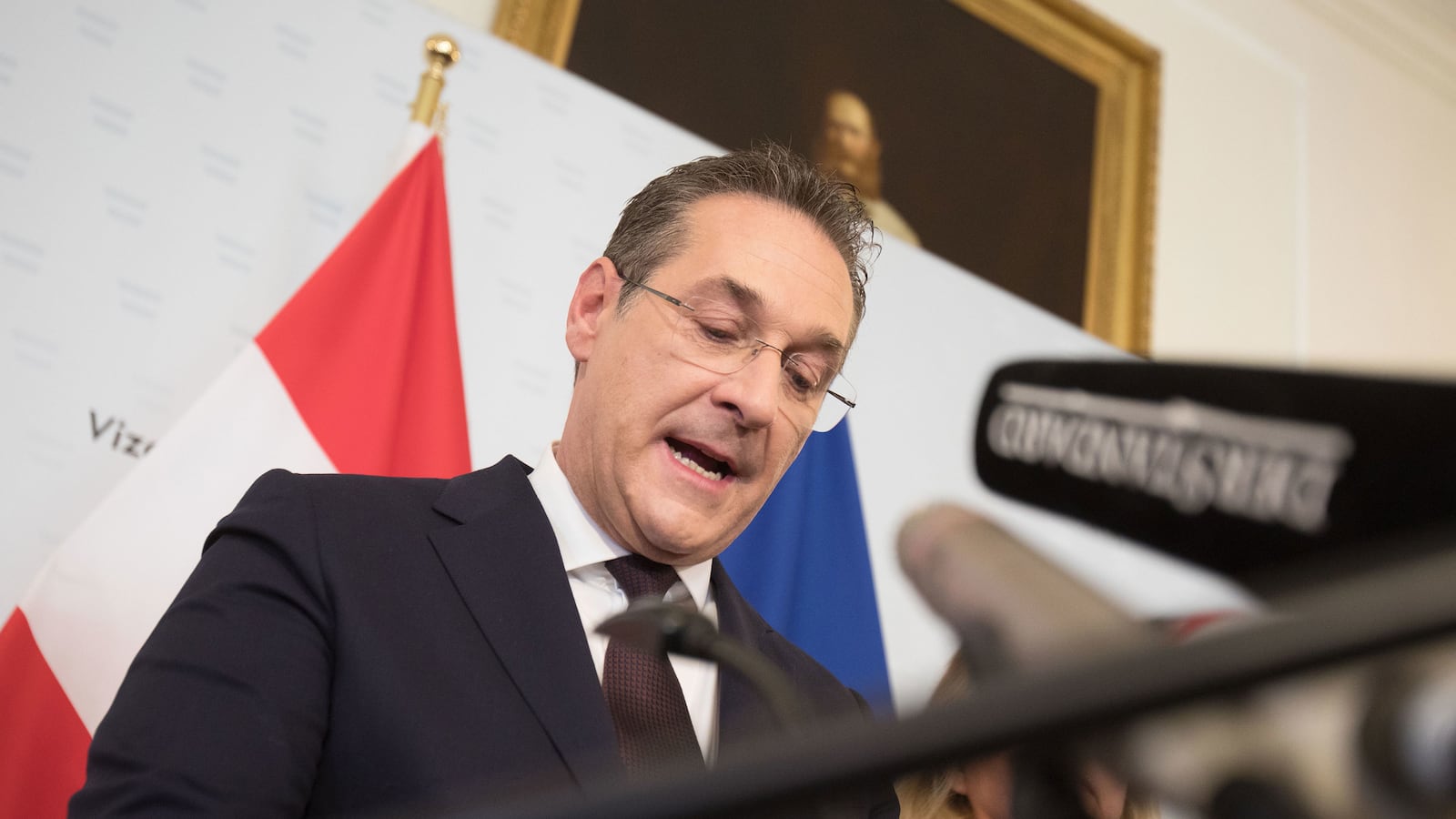You may not have heard the crash of Austria’s government collapsing on Monday, but the circumstances that brought it down are, shall we say, instructive about the way far-right populists in Europe, and at least one very prominent American politician, suck up to Russia.
More important still, the background to the debacle in Vienna speaks volumes about the way the populists try to control the press to keep voters from knowing or caring what goes on.
Let’s turn the clock back to 2017, to a villa on the Spanish resort island of Ibiza. The Champagne and Red Bull flowed as freely as the gossip about bedroom escapades, dubious campaign finance schemes, and whether the most efficient means of laundering rubles was through privatization of state assets or through casinos.
But that’s not what most interested Heinz-Christian Strache through seven languid hours, months before the Austrian election that bought his far-right Freedom Party of Austria into government alongside the somewhat more centrist party of Chancellor Sebastian Kurz. What interested Strache most was how to capture the Fourth Estate.
If that pretty young woman claiming to be the niece of a Russian oligarch was serious, Strache reckoned, then she’d go through with her proposal to buy half the shares of Kronen Zeitung, the tabloid which reaches a quarter of all Austrians, and repurpose it as a one-party propaganda sheet. “We want to build a media landscape like Orbán did,” he said, referring to the autocratic Hungarian leader Viktor Orbán, and knowing whereof he spoke.
Populism, strictly speaking, means appealing to the man in the street whose needs or grievances have been ignored by elites. But if you look at how more entrenched populist parties actually go about appealing to the masses in Hungary, Poland and Italy, they start by enlisting the elites to tell the man in the street what his needs and grievances are, then catering to those.
Inevitably, they proceed by coopting or bankrupting journalists, if not threatening violence against any who withstand those tactics and continue to put up a fight.
Orbán has indeed led the way here, steadily transforming Hungary’s once-vibrant media landscape into a vassalage of his Fidesz party, which has run Hungary for the last nine years.
Strache at one point during his Ibiza interlude suggested that Kronen Zeitung be controlled by Heinrich Pecina, a 66-year-old Austrian businessman who has emerged as Orbán’s press baron of choice, gobbling up a host of once essential Hungarian news outlets.
One of these is—or was—Népszabadság, the country’s largest left-wing opposition newspaper, founded during the Hungarian Revolution of 1956. Pecina’s Mediaworks bought it in 2014, then slowly softened its coverage on Hungarian financial and political interests seen as close to Orbán’s administration. A PR professional was brought on to monitor investigative stories. Soon a climate of self-censorship reigned, with reporters not even bothering to pitch articles they knew would ruffle Fidesz feathers.
Pecina shuttered Népszabadság in 2016, on the eve of its staff’s promised relocation to new headquarters, citing losses that others in the Hungarian press say were nonexistent. Within weeks Pecina sold Mediaworks to a company with alleged ties to Lőrinc Mészáros, a personal friend of Orbán’s.
A sneakier way to use the press to browbeat opponents is to outsource your attacks through reputable foreign outlets—a favorite tactic of the Kremlin.
Last Easter, the Scottish edition of the Sunday Times ran an item about a report published by the Moldovan parliament alleging that the Open Dialogue Foundation, a Warsaw-based NGO focused on democracy promotion in Eastern Europe and Central Asia, took “dirty money” and undermined the integrity of the Moldovan state.
There was a problem, however—or there should have been.
This exact story had already appeared in ‘Sieci, a Polish right-wing weekly heavily supportive of Jarosław Kaczyński’s Law and Justice Party.
Then leading pro-government mouthpieces in Poland such as Gazeta Polska and TV Republika used the fact that this story was now big enough to earn column inches in a major British broadsheet to push for shuttering the troublesome NGO.
Law and Justice, in other words, went overseas to take care of business at home.
All populist movements invent enemies and scapegoats. Jews, Muslims, migrants, journalists and powerful women are the most obvious, although the juiciest targets are those who embody or represent more than one category.
Matteo Camiciottoli, the mayor of the northern Italian city of Pontinvrea and member of Matteo Salvini’s reactionary League Party, posted to his personal Facebook page in 2017 that three North African immigrants who raped and assaulted a woman in Rimini “should be sent to the house of Laura Boldrini. Hopefully they’ll be able to to put a smile back on her face.”
Boldrini, a former president of Italy's lower house of parliament as well as a former spokesperson for the United Nations High Commissioner for Refugees, has for years faced anonymous death and rape threats (bullets sent to her in the mail, etc.) owing to her advocacy on behalf of asylum-seekers.
Salvini himself once appeared on stage at a political rally with a sex doll he claimed was Boldrini in effigy. But Camiciottoli’s comment marked the first time an elected League official seemed to be inciting sexual violence against the celebrated Italian feminist. Within a year, the League would become part of a tenuous coalition government.
Camiciottoli denied his sadism, stating, “I just wanted to make a political critique: if she is so in favor of uncontrolled immigration, which also includes criminals, then perhaps she would have been happy to host them.” A Savona court disagreed. It fined him €20,000 and ordered him to pay for the costs of his trial as well as make donations to five women’s charities.
Boldrini is also an author and journalist, another category of League enemies who have been put on notice that, if something bad happens to them, it’ll be their own fault.
Because of the strength of organized crime in Italy many journalists who’ve investigated La Cosa Nostra have been given police protection. There are now several cases in which Salvini has threatened to remove security details, or gone ahead and done so, owing to a reporter’s criticism of the League.
These include Donatella di Cesare, a Holocaust scholar who has received anti-Semitic threats from neo-fascist groups and whose police protection was revoked in 2018. Roberto Saviano, the author of the acclaimed mafia exposé Gomorra, has been informed by Salvini that his days of being shielded from the notorious subjects of his book are numbered. Sandro Ruotolo was notified of an order to remove his detail after he started hosting a vlog investigating Salvini's party. Salvini only climbed down in that instance after a public uproar.
Austria’s information space had been headed in much the same anti-democratic direction before Strache imagined stealthily turning Kronen Zeitung into a loyalist rag. The vice chancellor had earlier declared his intent to eliminate the excise tax for ORF, the country’s largest media outlet and Austria’s equivalent to the BBC, which carries a similar license fee to charge viewers for its financial upkeep.
Strache referred to ORF as “a place where lies become news,” and so his goal in shrinking the budget of a public broadcaster—while evidently trying to boost the Freedom Party’s influence over private media outlets—isn’t hard to divine.
As Index on Censorship’s Lisa Maria Weinberger noted, “Terms like ‘fake news’ and ‘lügenpresse’ (lying press) have been taken up not only by nationalist movements but have found their way into Austrian public debates and online forums.” Perhaps this is because the purveyors of the lügenpresse libel, whose sinister overtones in German-speaking countries requires no explanation, had been appointed to undeserved roles in government.
Alexander Höferl was chosen to head communications in Austria's Interior Ministry after a Bannonesque tenure as editor-in-chief of unzensuriert.at, a conspiracist portal known for frothing about Muslims, migrants and Freedom Party antagonists.
Additionally, unzensuriert.at and other Austrian Breitbarts posted the personal information and photos of several well-known journalists who’d been doxed by party youth activists. Freedom Party officials then posted that information on their personal Facebook pages, precipitating online trolling. Strache was one such official.
In fact, as it is Kronen Zeitung was essential to Kurz’s far right government, which collapsed on Monday in the wake of "Ibizagate." The Daily Beast correspondent in Berlin, Josephine Huetlin, reports that while the print edition of Kronen Zeitung was very cozy with Sebastian Kurz, the online edition worked closely with Strache’s Facebook page to set the populist political agenda. (Sometimes this involved publishing false news and misleading pictures that incited hatred against Muslims and immigrants.)
Were it not for a candid camera in Ibiza, then, the Austrian media would have no doubt found itself increasingly in hostile terrain, subject to takeover, liquidation or worse. And while we still don’t know the identity or agenda of those who snared Strache in this bold sting operation, the results are nevertheless encouraging. Thousands of people marched in the streets of Vienna against a party that contrived, under illegal circumstances and the veil of plausible deniability, to tell them what to think and present itself as the tribune for such thoughts.
No thanks, said the people.
How’s that for populist backlash?
This article has been updated. An earlier version stated that the authors of the Sunday Times article were lobbyists. One of them has press card, one of them runs a public relations company.








